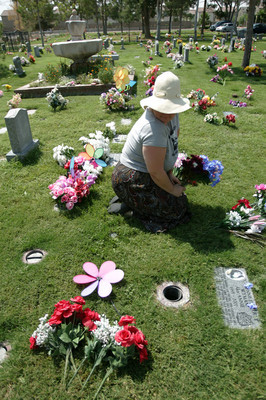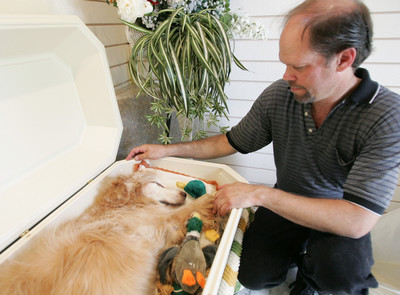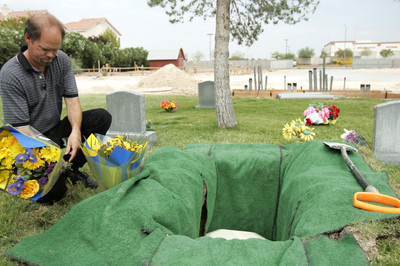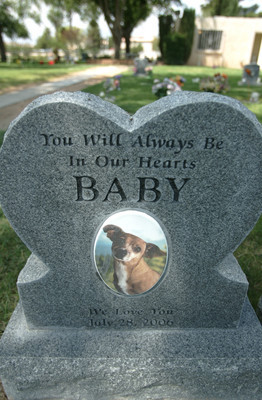A Death in the Family
As a therapist, Gary Alexander works with clients who have lost their pets. He is familiar with the effects and stages of grief.
But, he was not prepared to experience them.
"It was just devastating," Alexander says of the death of his Doberman pinscher, Sheila, two years ago. "I was surprised at how that sent me through the ringer. That first week I had to cancel all my sessions. I was a wreck."
Their love is unconditional. They're always around. Pets are there for the good times, the bad and everything in between. So when they die, it can not only be disruptive but depressing.
Indeed, many pet owners are taken by surprise that the loss of their pet leaves them feeling as desolate as the loss of a family member, grief experts say. And dealing with that loss can be difficult in a society that sometimes views animals as a commodity, downplaying the impact they have on their owners' lives.
But pets have become family members in their own right, says therapist Darlene Cross, so it's understandable that their deaths cause grief.
"What's happened is pets have taken on a new role in our family. As we're living alone and away from our families, our pets have become more important to us," says Cross, who specializes in grief and loss.
When a pet dies, the best way to cope is to first accept that it's OK to be upset, therapists say. Then, surround yourself with others who understand.
A faithful companion for five years, Alexander's dog was there for the high and low points: the death of a family member, his graduation from graduate school. Her antics brought Alexander a lot of joy; her death brought him a lot of sorrow. It's hard to deal with such a loss surrounded by those who don't view animals in the same way, Alexander says.
"I think people are embarrassed and a little ashamed when they're feeling such loss and grief over what they're told is just an animal," Alexander says. "So much of the time what we need is just somebody who's been through that same experience or someone who will listen. That's really a healing process right there."
Make it a family issue, Cross says. A pet's death can be an invaluable way to teach children a life lesson.
"I lost my own dog, Murphy, last year and there's never a day that I don't miss him," she says. "He went through my children growing up and leaving home. He went through my mother's death; when I came home after the funeral he was there. When he died, I lost a member of my family. I made this a family event including my 4 year-old grandson."
She explained Murphy's death and told her grandson that it was OK to be sad. Talking about the pet is sometimes the easiest way to deal with grief, she adds.
Find someone to talk to who will listen to your stories about your pet as many times as you need to tell them, Cross says. Look at photos. Let yourself remember the good times and the fun and silly things your pet did.
"I miss the funny things they used to do," says Bev Watts of her dogs, Tundra and Kongo. Both died earlier this year of old age. "I'd come home and see hair on my bed or the couch and I'd say 'Tundra, did you go up here?' She'd look at me with those eyes, roll over and let me rub her tummy. Her tail would start wagging."
Those memories have given Watts comfort in the past few months. Still, there are days when she is as sad as she was the day her dogs died.
That's not surprising, says Kathi Zellers, a therapist who specializes in pet grief and loss. Grief is fluid; some days will be good, others not.
"Someone once (said) to me that grief is sort of like a basketball that's suddenly shoved into your chest that you have to carry around with you," Alexander says. "It never shrinks, but over time, you build a barrier around it. But it's always that same size grief. As time has passed, I can think about Sheila and still get emotional and feel that basketball-sized grief. But it gets better."
Occasionally, Michelle Parantala, a veterinarian at Desert Inn Animal Hospital, will get a call from a client who wants to talk about the death of his or her pet, days and even weeks after the fact. Veterinarians don't usually deal with grief issues once a pet has died, she says. But most veterinarians recognize that there often is a need for follow-up, so they keep materials on-hand, as well as phone numbers of local grief counselors.
Maryann Phillips, a veterinary technician who deals with clients after their pets have died at the Desert Inn Animal Hospital, says she often maintains relationships with grieving clients. It's important for them to know that someone cares, she notes.
"I tell them to call me if they're having a bad day. I had one client who called me every day for two months after her pet died," Phillips says.
Part of her job is arranging for the cremation of pets. She often helps clients pick out urns if they plan to keep the remains.
Many people find comfort in keeping their pets' remains, Zellers says. Others prefer to bury them at the Craig Road Pet Cemetery so that they have a place to visit.
More than 6,000 animals are buried there, says one of the cemetery owners, Gail Mastny.
KVBC-TV, Channel 3 weatherman John Fredericks recently had a funeral at the cemetery for his dog, Jordan; dozens of people attended, demonstrating that many find comfort in such a service, Watts says.
"I think there's a lot of different ways for people to grieve and heal," Zellers says. "There are a lot of good books to read about pet loss. Check out the Internet for pet loss support groups."
Watts got a new puppy shortly after Tundra died in March. That helped a lot, she says, especially after Kongo died in May.
But there are two schools of thought on getting a new pet after the death of an old one, Zellers says.
"I recommend people wait a little while. Sometimes people do it for the wrong reasons, they're trying to replace the lost pet," Zellers says. "It's good to get closure before they do that."
Keep in mind that there is no timeline for grief, either, therapists say. It can takes days, weeks, months, even years.
If you find that you can't move on or that the grief is too disruptive to daily life, that might be a good time to seek professional counseling, Cross says.
RESOURCES
The University of California, Davis, School of Veterinary Medicine, offers a pet grief hot line from 6:30 to 9:30 p.m. Mondays through Fridays (530) 752-4200 or (800) 565-1526.
Proctor & Gamble offers a toll-free pet care and pet loss support hot line from 8 a.m. to 5 p.m. Mondays through Fridays (888) 332-7738. Callers may have to wait on hold.
The Florida Animal Health Foundation operates the Florida Pet Grief Support hot line, an international hot line that's available 24 hours daily. Callers often have to leave a message, but calls are returned at no cost to them (352) 392-4700, Ext. 4080. The phone company will charge long distance rates, however.
On the Internet, www.petloss.com features a message board and chat room where people can talk about their pets.






















